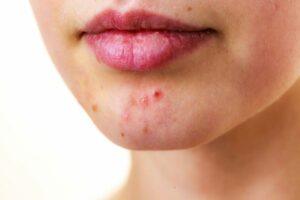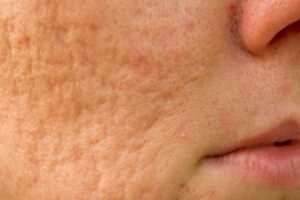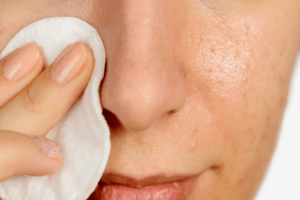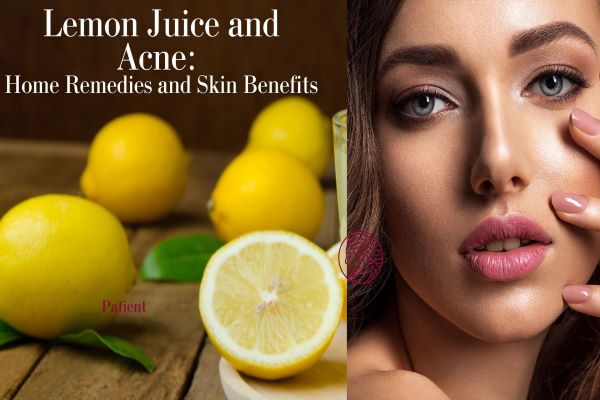 What is this buzz about lemon juice and acne? Lemon juice is a popular ingredient in skin care products because of its antioxidants and vitamin C content. These properties help reduce free radicals and boost collagen levels in the skin, respectively.
What is this buzz about lemon juice and acne? Lemon juice is a popular ingredient in skin care products because of its antioxidants and vitamin C content. These properties help reduce free radicals and boost collagen levels in the skin, respectively.
However, lemon juice can also have negative side effects when applied directly to the skin. For this reason, it is important to consider other treatments before using lemon juice on your skin.
When used properly, lemon juice can help to dry out pimples and fade acne scars. Lemon juice can also be used as a toner to help brighten the skin.
You can find pure lemon juice or therapeutic graded lemon essential oil from amazon.
Lemon juice and acne
What is acne?

Acne is a common skin condition that affects many people. It occurs when the pores in the skin become clogged with oil and dead skin cells. This can lead to the development of pimples, blackheads, and other blemishes. Acne can be a source of embarrassment and frustration for many people.
Does lemon juice help acne?
How can lemon juice clear acne? Lemon juice is a popular home remedy for acne. It is said to be a natural disinfectant and helps dry out pimples.
Some people also believe that the antioxidants in lemon juice can help improve skin health. In addition, lemon juice is high in vitamin C, which some people believe can help fade scars.
Lemon juice also has astringent and antibacterial properties. This means it can help remove excess oil from the skin and kill bacteria that may cause acne.
It is important to note that people’s experiences vary when it comes to the topic of lemon juice for acne.
Find pure lemon juice or therapeutic graded lemon essential oil on amazon.
Does lemon juice help acne scars?

The antioxidants present in lemon juice help reduce free radicals and boost collagen levels in the skin for younger and healthier-looking skin.
However, lemon juice can have negative side effects when applied directly to the skin, such as stinging and skin irritation. For this reason, lemon juice should not be used as a standalone treatment for acne scars, though some people have also reported benefits from it.
Lemon juice can be incorporated into a more comprehensive skin care regimen. There are many other effective treatments for acne scars, such as laser therapy or dermabrasion, that should be considered before using lemon juice.
Lemon Juice benefits skin? Antioxidants and vitamin C in lemon juice

One of the many benefits of lemon juice is that it is high in antioxidants and vitamin C. These nutrients help to protect the skin from damage caused by free radicals, which can lead to wrinkles and other signs of aging.
Additionally, lemon is a natural astringent. With this property, it can potentially help to tighten and tone the skin. This can be beneficial for reducing the appearance of pores and tightening saggy skin.
Finally, lemon juice is also a good source of vitamin B6, which is important for maintaining healthy skin. Vitamin B6 helps to keep the skin hydrated and prevents dryness.
These potential benefits may be the reason why many people use lemon for face or include it in their skin care routine to help achieve and maintain healthy, youthful-looking skin.
Here you’ll find pure lemon juice or therapeutic graded lemon essential oil
The negative side effects of using lemon juice on your skin
Lemon juice can cause some side effects when used on the skin directly.
Some people may experience dryness, redness, or irritation. In some cases, lemon juice may even make acne worse.
In addition, lemon juice can make the skin more sensitive to sunlight. This can lead to sunburn or other skin damage.
5 Alternative treatments for acne
There are many alternative treatments for acne available. Some people find that lemon juice is an effective treatment, while others find that it can have negative side effects. Some other alternative treatments include:
1) Tea tree oil: Tea tree oil is a natural antibacterial agent that can help reduce inflammation and kill the bacteria that cause acne. It can be applied directly to the skin or added to a moisturizer.
2) Azelaic acid: Azelaic acid is a naturally occurring compound that helps to reduce inflammation and kill the bacteria that cause acne. It can be found in over-the-counter products or prescribed by a doctor.
3) Salicylic acid: Salicylic acid is a beta hydroxy acid that helps to remove the dead skin cells that can clog pores and cause acne. It can be found in over-the-counter products or prescribed by a doctor.
4) Aloe vera: Aloe vera is a plant that has anti-inflammatory and antibacterial properties. It can be applied directly to the skin, added to a moisturizer, or found in over-the-counter products.
5) Rosehip oil: Rosehip oil is a natural oil that helps to reduce inflammation and support skin healing. It can be applied directly to the skin or can be found in over-the-counter products.
If you are considering using lemon juice as an acne treatment, it is important to speak with a dermatologist first. They will be able to advise you on whether or not it is an appropriate treatment for your case.
How to make lemon juice: 3 home remedies for the skin

Lemon juice can be a great natural treatment for acne, but it is important to use it carefully. The acidic nature of lemon juice can cause skin irritation and dryness, so it is important to dilute the juice before applying it to the skin.
When it comes to home remedies, lemon juice acne treatment is done when Lemon juice has been applied to the skin in the following ways:
1) You can mix lemon juice with water, aloe vera gel, or rosehip oil to create a soothing mixture that will help to reduce inflammation and redness. To do this, mix equal parts lemon juice and aloe vera gel, or rosehip oil.
- Apply the mixture to your skin with a cotton ball or pad, and let it sit for 15-20 minutes before rinsing it off with cool water.
- Repeat this process 1-2 times per day until you see an improvement in your skin.
2) Another option is to make a face mask when you mix it with water and honey. To do this, simply mix equal parts lemon juice, water, and honey. Apply the mixture to your face, and let it sit for 15-20 minutes before
3) Some people add a few drops of lemon juice to their regular moisturizer or face wash.
it is important to test the lemon juice on a small area before using it over your entire face. It is also important to avoid.
3 important tips to reduce skin sensitivity when using lemon juice.
It is important to remember that lemon juice can make the skin more sensitive to sunlight.
- So it is important to use sunscreen if you are going to be spending time outdoors after applying lemon juice to your skin.
- If you have sensitive skin, it is important to test the lemon juice on a small area of skin before applying it more broadly.
- You may want to start by mixing one part lemon juice with four parts water. If your skin does not react negatively, you can increase the ratio of lemon juice to water.
Pros and cons of using lemon juice on your skin
Pros of lemon juice for skin:
- It may help reduce redness
- Can help fight-off inflammation
- Good source of antioxidants
- Can help boost collagen levels
- Can reduce free radicals
Cons of lemon juice for skin:
- It can be drying
- Can be irritating to the skin
- Increases skin sensitivity to sunlight
Amazon stocks pure lemon juice or therapeutic graded lemon essential oil
Talk to your dermatologist
When considering lemon for face to help clear your acne, it’s important to talk to your dermatologist first. They can help you decide if this treatment is right for you and provide guidance on how to use it safely.
Conclusion
Considered one of the most popular home remedies for acne, lemon juice is a natural treatment that can help to reduce inflammation and redness. However, it is important to use caution when applying lemon juice to your skin, as the acidic nature of the juice can cause skin irritation and dryness. When used correctly, however, lemon juice can be an effective treatment for acne. If you are considering using lemon juice as an acne treatment, be sure to speak with your dermatologist first. They will be able to advise you on whether or not it is an appropriate treatment for your case.
Thank you for reading! We hope this article was helpful in learning more about the pros and cons of using lemon juice on your skin.
Share your experience in the comment section below if you have used lemon juice before, how you applied it and what the outcome was.
